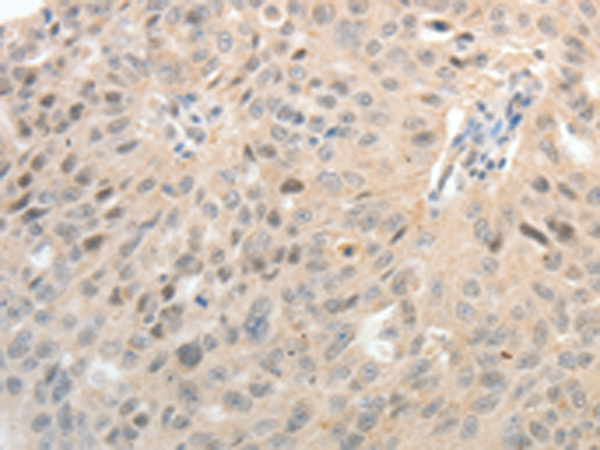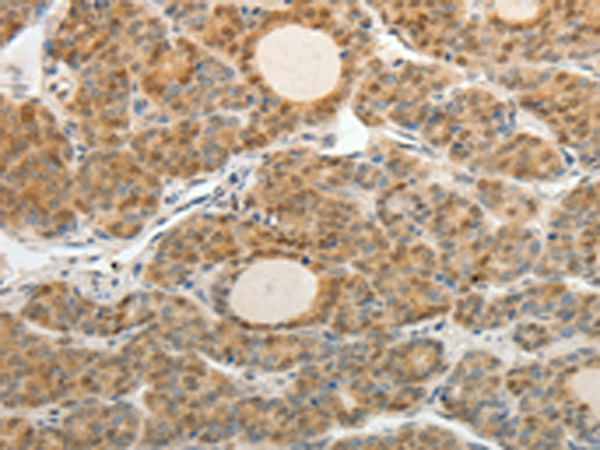

| WB | 咨询技术 | Human,Mouse,Rat |
| IF | 咨询技术 | Human,Mouse,Rat |
| IHC | 1/50-1/200 | Human,Mouse,Rat |
| ICC | 技术咨询 | Human,Mouse,Rat |
| FCM | 咨询技术 | Human,Mouse,Rat |
| Elisa | 1/3000-1/10000 | Human,Mouse,Rat |
| Aliases | ASH1; HASH1; MASH1; bHLHa46 |
| Host/Isotype | Rabbit IgG |
| Antibody Type | Primary antibody |
| Storage | Store at 4°C short term. Aliquot and store at -20°C long term. Avoid freeze/thaw cycles. |
| Species Reactivity | Human, Mouse, Rat |
| Immunogen | Synthetic peptide of human ASCL1 |
| Formulation | Purified antibody in PBS with 0.05% sodium azide and 50% glycerol. |
+ +
以下是关于ASCL1抗体的3篇参考文献及其摘要概括:
---
1. **标题**:*ASCL1 is a lineage oncogene transcription factor for small cell lung cancer*
**作者**:Pleasance, E.D., et al.
**摘要**:该研究利用ASCL1抗体通过免疫组化分析,证实ASCL1在特定小细胞肺癌(SCLC)亚型中的高表达,并揭示其作为转录因子调控肿瘤增殖的关键作用,为靶向治疗提供依据。
2. **标题**:*ASCL1-specific antibodies for the identification of pulmonary high-grade neuroendocrine carcinoma*
**作者**:Travis, W.D., et al.
**摘要**:文章评估了ASCL1抗体在肺神经内分泌肿瘤诊断中的应用,证明其与常规标志物(如Synaptophysin)的互补性,并强调其在区分高/低级别肿瘤中的临床价值。
3. **标题**:*The role of ASCL1 in neuroendocrine differentiation of prostate cancer*
**作者**:Brenner, J.C., et al.
**摘要**:研究通过免疫染色和Western blot,发现ASCL1抗体可特异性标记前列腺癌中的神经内分泌转化细胞,揭示其通过调控Notch通路促进肿瘤异质性的机制。
---
以上文献涵盖ASCL1抗体在癌症诊断、分子分型及机制研究中的应用,均聚焦于其作为生物标志物或功能调控因子的重要性。如需具体发表年份或期刊,建议通过PubMed等平台进一步检索。
ASCL1 (Achaete-scute homolog 1) is a basic helix-loop-helix (bHLH) transcription factor primarily known for its role in neuronal and neuroendocrine differentiation. It regulates the development of specific neural crest-derived cells, including autonomic neurons and pulmonary neuroendocrine cells. ASCL1 is also a master regulator of the "proneural" gene network, driving cell fate decisions in progenitor cells during embryogenesis.
In research, ASCL1 antibodies are widely used to detect ASCL1 protein expression in tissues or cell lines, aiding studies on neurodevelopment, neural stem cell differentiation, and cancer biology. ASCL1 is notably overexpressed in aggressive neuroendocrine tumors, such as small cell lung cancer (SCLC), Merkel cell carcinoma, and neuroblastoma. Its antibody serves as a diagnostic marker to distinguish these malignancies from other cancer subtypes.
ASCL1 antibodies are employed in techniques like immunohistochemistry (IHC), Western blot (WB), and immunofluorescence (IF). Researchers also explore its therapeutic potential, as ASCL1 inhibition may suppress tumor growth in ASCL1-driven cancers. However, its transient expression during early differentiation poses technical challenges in detection. Validated antibodies with high specificity are critical to avoid cross-reactivity with other bHLH family members.
Overall, ASCL1 antibodies are essential tools for unraveling mechanisms in developmental biology, regenerative medicine, and oncology.
×